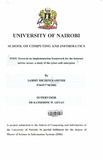| dc.contributor.author | Kamunda, Sammy M | |
| dc.date.accessioned | 2013-03-14T11:00:40Z | |
| dc.date.issued | 2006 | |
| dc.identifier.citation | Master of Science in Information Systems | en |
| dc.identifier.uri | http://erepository.uonbi.ac.ke:8080/xmlui/handle/123456789/13806 | |
| dc.description.abstract | The software industry has continued to dominate the information communication
technology sector for a long time now. For the last decade, it has been the fastest
growing industry in the world of computers. Computer hardware designers have
continued to improve on their designs to cope with the high demands of new and
novel applications that come with improved software. To some extent, software has
tried to replace hardware in areas like the entertainment industry. We have software
that can enable you watch music and movies on a computer.
The unfortunate thing is that the said software is prohibitively expensive for the
developing countries. In trying to catch up with the rave in Information
Communication Technology (ICT) industry, the developing countries have resulted to
unorthodox methods to enable them realise the advantages of embracing ICT in both
the public and private sector. This has the said countries appear in bad books in as far
as international patenting laws are concerned.
Fortunately, a solution is now available the name of Free Open Source Systems
(FOSS), which do not require a lot of money to acquire and maintain. Their licenses
are free, require no yearly renewal, and continued upgrades. It's actually a Godsend
solution for the 'developing countries' dilemma in the software industry. There is
every need that the FOSS solution is embraced by all, especially those with limited
resources to acquire and maintain commercial software legally. | en |
| dc.description.sponsorship | University of Nairobi | en |
| dc.language.iso | en | en |
| dc.publisher | University of Nairobi | en |
| dc.subject | FOSS | en |
| dc.subject | Implementation framework | en |
| dc.subject | Internet service sector | en |
| dc.subject | Cyber-cafe enterprise | en |
| dc.title | FOSS: Towards an Implementation framework for the Internet service sector, a study of the cyber-cafe enterprise | en |
| dc.type | Thesis | en |
| local.publisher | School of Computing and Informatics | en |

